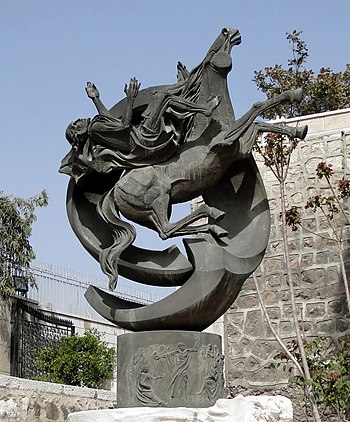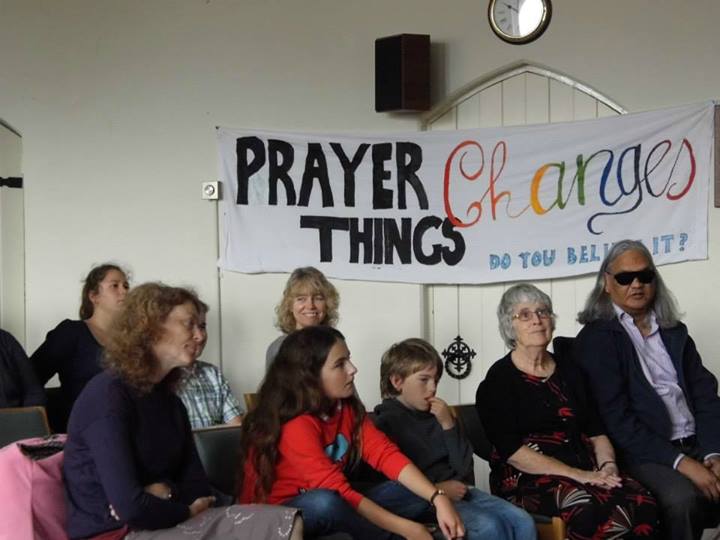“3 Want dit is [de] wil van God, uw heiliging: dat gij u onthoudt van de hoererij; 4 dat een ieder van u zijn eigen vat weet te bezitten in heiliging en eerbaarheid, 5 (niet in wellustige begeerte, zoals de volken, die God niet kennen), 6 en dat men de rechten van zijn broeder niet vertrede, noch hem bedriege in die 1 zaak, want de Heer is een wreker van dit alles, zoals wij u ook vroeger gezegd en betuigd hebben. {1. Lett. ‘de’. De bedoeling is, dat men de rechten van zijn broeder niet vertreedt, noch hem bedriegt, door met zijn vrouw overspel te bedrijven.}
7 Want God heeft ons niet geroepen tot onreinheid, maar in heiliging. 8 Daarom, wie [dit] veracht, veracht niet een mens, maar God, die u ook zijn Heilige Geest gegeven heeft.
9 Wat nu de broederliefde betreft, hierover is het niet nodig u te schrijven; want zelf zijt gij door God onderwezen om elkaar lief te hebben; 10 gij doet dat dan ook ten aanzien van alle broeders, die in heel Macedonië zijn. Maar wij vermanen u, broeders, daarin nog toe te nemen 11 en u te beijveren om rustig te zijn en uw eigen zaken te doen en met uw eigen handen te werken, zoals wij u bevolen hebben, 12 opdat gij welvoeglijk wandelt tegenover hen die buiten zijn en van niemand [iets] nodig hebt. 2 {2. Of ‘niets nodig hebt’.}” (1 Thessalonicen 4:3-12 VoorhNT4)
“2 Houdt het voor enkel vreugde, mijn broeders, wanneer gij in velerlei verzoekingen valt, 3 want gij weet dat de beproeving van uw geloof volharding werkt. 4 Maar laat de volharding een volmaakt werk hebben, opdat gij volmaakt en volkomen zijt en het u aan niets ontbreekt.
5 En als aan iemand van u wijsheid ontbreekt, laat hij [die] vragen aan God, die aan allen geeft, mild en zonder verwijt, en zij zal hem gegeven worden. 6 Maar laat hij vragen in geloof, zonder te twijfelen. Want wie twijfelt, is gelijk aan een golf van de zee, die door de wind gedreven en op en neer geworpen wordt. 7 Want zo iemand moet niet menen dat hij iets ontvangen zal van de Heer; 8 [hij is] een wankelmoedig man, onbestendig in al zijn wegen. 9 Maar laat de geringe broeder roemen in zijn hoogheid, 10 en de rijke in zijn geringheid, omdat hij als een bloem van het gras zal vergaan.” (Jakobus 1:2-10 VoorhNT4)
“12 Welgelukzalig de man die verzoeking verdraagt; want beproefd bevonden, zal hij de kroon des levens ontvangen, die Hij beloofd heeft aan hen die Hem liefhebben.
13 Laat niemand, als hij verzocht wordt, zeggen: Ik word door God verzocht. Want God kan niet verzocht worden door het kwade en Hijzelf verzoekt niemand. 14 Maar een ieder wordt verzocht, als hij door zijn eigen begeerte meegesleept en verlokt wordt. 15 Daarna, als de begeerte bevrucht is, baart zij zonde; en als de zonde voleindigd is, brengt zij de dood voort.” (Jakobus 1:12-15 VoorhNT4)
“19 Weet [dit], mijn geliefde broeders: ieder mens moet snel zijn om te horen, traag om te spreken, traag tot toorn.
20 Want de toorn van een man volbrengt Gods gerechtigheid niet. 21 Daarom, legt af alle onreinheid en overmaat van boosheid en ontvangt met zachtmoedigheid het ingeplante woord, dat uw zielen behouden kan.
22 En weest daders van het woord en niet alleen hoorders, anders misleidt gij uzelf. 23 Want als iemand een hoorder van het woord is en niet een dader, dan is hij gelijk aan een man die zijn natuurlijk gezicht in een spiegel beschouwt; 24 want hij heeft zich beschouwd, is weggegaan en is onmiddellijk vergeten, hoe hij er uitzag. 25 Maar wie inziet in de volmaakte wet, die van de vrijheid, en daarbij blijft, niet als een vergeetachtig hoorder, maar als een dader van het werk, zal welgelukzalig zijn in zijn doen.
26 Als iemand meent godsdienstig te zijn en zijn tong niet in toom houdt, maar zijn hart misleidt, diens godsdienst is waardeloos. 27 Reine en onbesmette godsdienst voor God en de Vader is: wezen en weduwen te bezoeken in hun verdrukking en zichzelf onbevlekt van de wereld te bewaren.” (Jakobus 1:19-27 VoorhNT4)
“1 Mijn broeders, hebt het geloof van onze Heer Jezus Christus, [de Heer] der heerlijkheid, niet met aanzien des persoons. 2 Want als er in uw synagoge een man binnenkomt met een gouden ring, in prachtige kleding, en er komt ook een arme binnen in vuile kleding, 3 en gij ziet op naar hem die de prachtige kleding draagt en zegt: Zit gij hier op een goede plaats, en tot de arme zegt gij: Sta gij daar, of: Zit hier onder [bij] mijn voetbank, 4 hebt gij dan niet bij uzelf onderscheid gemaakt en zijt rechters geworden met boze overleggingen?” (Jakobus 2:1-4 VoorhNT4)
“8 Als gij dan de koninklijke wet volbrengt, naar de Schrift: ‘Gij zult uw naaste liefhebben als uzelf’, 2 dan doet gij wèl. {2. #Le 19:18.} 9 Maar als gij de persoon aanziet, doet gij zonde en wordt door de wet overtuigd als overtreders.
10 Want wie de hele wet houdt, maar op één [punt] struikelt, is schuldig geworden aan alle. 11 Want [Hij] die gezegd heeft: ‘Gij zult geen overspel plegen’, heeft ook gezegd: ‘Gij zult niet doden.’ 1 Als gij nu geen overspel pleegt, maar wel doodt, dan zijt gij een overtreder van de wet geworden. {1. #Ex 20:13,14.}
12 Spreekt zó en doet zó als zij die door de wet van de vrijheid geoordeeld zullen worden. 13 Want zonder barmhartigheid zal het oordeel zijn over hem die geen barmhartigheid betoond heeft. De barmhartigheid roemt tegen 2 het oordeel. {2. Of ‘triomfeert over’.}
14 Wat baat het, mijn broeders, als iemand zegt dat hij geloof heeft, en hij heeft geen werken?
Kan het geloof hem redden?
15 Als nu een broeder of zuster gebrek heeft aan kleding en aan dagelijks voedsel, 16 en iemand van u zegt tot hen: Gaat heen in vrede, warmt u en verzadigt u, maar gij geeft hun niet, wat zij voor het lichaam nodig hebben, wat baat het?
17 Zo is ook het geloof, als het geen werken heeft, op zichzelf genomen, dood.
18 Maar iemand zal zeggen: Gij hebt geloof en ik heb werken. Toon mij uw geloof zonder werken en ik zal u mijn geloof tonen uit mijn werken.
19 Gij gelooft dat God één is; gij doet wèl; dat geloven de boze geesten ook en zij sidderen. 20 Maar wilt gij weten, nietig mens, dat het geloof zonder de werken dood 3 is? {3. V.l. ‘ledig’.}
21 Is Abraham, onze vader, niet op grond van werken gerechtvaardigd, toen hij Izaäk, zijn zoon, op het altaar geofferd had?
22 Gij ziet, dat het geloof samenwerkte met zijn werken en dat het geloof uit de werken volmaakt werd.
23 En de Schrift werd vervuld, die zegt: ‘En Abraham geloofde God en het werd hem tot gerechtigheid gerekend’, 4 en hij werd een vriend van God genoemd. {4. #Ge 15:6.}
24 Gij ziet dat een mens op grond van werken gerechtvaardigd wordt en niet op grond van geloof alleen.
25 En is niet evenzo Rachab, de hoer, op grond van werken gerechtvaardigd, toen zij de boden opgenomen en langs een andere weg uitgelaten had? 26 Want zoals het lichaam zonder geest dood is, zo is ook het geloof zonder de werken dood.” (Jakobus 2:8-26 VoorhNT4)
“13 Wie is wijs en verstandig onder u? Laat hij zijn werken tonen uit een goede wandel in zachtmoedigheid van de wijsheid. 14 Maar als gij bittere naijver en twistzucht in uw hart hebt, beroemt u dan niet en liegt niet tegen de waarheid. 15 Dat is niet de wijsheid die van boven komt, maar zij is aards, zinnelijk, duivels. 16 Want waar naijver en twistzucht is, daar is verwarring en allerlei kwaad. 17 Maar de wijsheid die van boven is, is in de eerste plaats rein, vervolgens vreedzaam, inschikkelijk, gezeggelijk, vol barmhartigheid en goede vruchten, onpartijdig, ongeveinsd. 18 Maar de vrucht van de gerechtigheid wordt in vrede gezaaid voor hen die vrede maken.” (Jakobus 3:13-18 VoorhNT4)
“1 Vanwaar oorlogen en vanwaar twisten onder u? Is het niet hiervan: van uw hartstochten, die in uw leden strijd voeren?
2 Gij begeert, en hebt niet; gij moordt en gij benijdt, en kunt niet verkrijgen; gij vecht en strijdt. Gij hebt niet, omdat gij niet bidt. 3 Gij bidt en ontvangt niet, omdat gij [in] verkeerde [gezindheid] bidt, om het in uw hartstochten door te brengen. 4 Overspeligen, weet gij niet, dat vriendschap met de wereld vijandschap is tegen God? Wie dus een vriend van de wereld wil zijn, betoont zich een vijand van God. 5 Of meent gij dat de Schrift tevergeefs spreekt? Begeert de Geest, die in ons woont, met naijver? 6 Maar hij geeft grotere genade. Daarom zegt hij: ‘God weerstaat de hoogmoedigen, maar de nederigen geeft Hij genade.’ 1 {1. #Spr 3:34.} 7 Onderwerpt u dan aan God. Weerstaat de duivel en hij zal van u vluchten. 8 Nadert tot God en Hij zal tot u naderen. Reinigt de handen, zondaars, en zuivert de harten, gij die wankelmoedig zijt. 2 {2. Eig. ‘dubbelhartigen’.} 9 Beseft uw ellende, treurt en weent; uw lachen worde veranderd in treuren en uw blijdschap in verslagenheid. 10 Vernedert u voor [de] Heer, en Hij zal u verhogen. 11 ¶ Spreekt geen kwaad van elkaar, broeders. Wie van zijn broeder kwaad spreekt of zijn broeder oordeelt, spreekt kwaad van de wet en oordeelt de wet. En als gij de wet oordeelt, zijt gij geen dader van de wet, maar een rechter. 12 Eén is de Wetgever en Rechter, Hij, die behouden en verderven kan. Maar wie zijt gij, dat gij de naaste oordeelt?” (Jakobus 4:1-12 VoorhNT4)
“7 Hebt dan geduld, broeders, tot de komst van de Heer. Zie, de landman wacht op de kostelijke vrucht van het land en heeft er geduld mee, totdat deze de vroege en late regen ontvangt. 8 Hebt ook gij geduld, sterkt uw harten, want de komst van de Heer is nabij.
9 Zucht niet tegen elkaar, broeders, opdat gij niet geoordeeld wordt. Zie, de Rechter staat voor de deur. 10 Broeders, neemt tot een voorbeeld van lijden en geduld de profeten, die in de naam van [de] Heer gesproken hebben.” (Jakobus 5:7-10 VoorhNT4)
“12 Maar vóór alles, mijn broeders, zweert niet, noch bij de hemel, noch bij de aarde, noch enige andere eed. Maar uw ja zij ja, en uw neen neen, opdat gij niet onder het oordeel valt. 13 Lijdt iemand onder u? Laat hij bidden. Is iemand welgemoed? Laat hij lofzingen.
14 Is iemand onder u ziek? Laat hij de oudsten van de gemeente bij zich roepen en laten zij over hem bidden en hem zalven 1 met olie in de naam van [de] Heer. {1. Of ‘nadat zij hem gezalfd hebben’.} 15 En het gebed van het geloof zal de zieke behouden, en de Heer zal hem oprichten; en als hij zonden gedaan heeft, het zal hem vergeven worden. 16 Belijdt dan elkaar de misdaden 2 en bidt voor elkaar, opdat gij genezen wordt. Het krachtig gebed 3 van een rechtvaardige vermag veel. {2. V.l. ‘zonden’. 3. Of ‘een vurige smeking’.}” (Jakobus 5:12-16 VoorhNT4)
“19 Mijn broeders, als iemand onder u van de waarheid afdwaalt en een ander brengt hem terug, 20 weet dan, dat wie een zondaar van zijn dwaalweg terugbrengt, een ziel van de dood redden en een menigte van zonden bedekken zal.” (Jakobus 5:19-20 VoorhNT4)
*





































































































































































